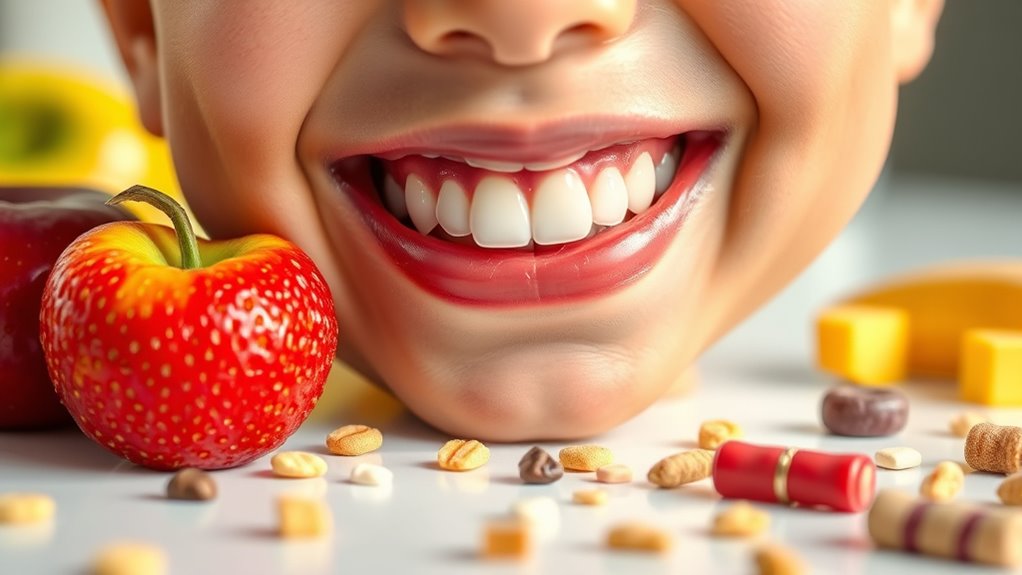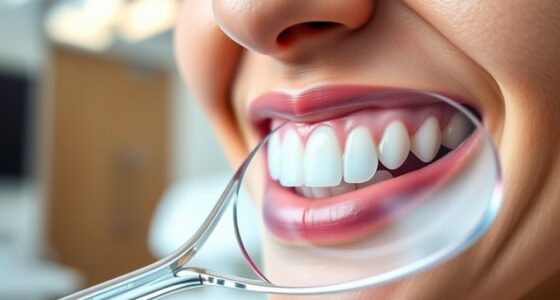Your child’s diet plays a vital role in their dental health. Foods rich in calcium, vitamin D, and other minerals strengthen enamel, while sugary and acidic snacks can feed bacteria that cause cavities and enamel erosion. Choosing healthy options like dairy, crunchy vegetables, and water helps protect teeth from decay. Managing snack choices and maintaining good oral hygiene are key to long-term dental wellness. Keep exploring to discover simple ways to support your child’s bright, healthy smile.
Key Takeaways
- A balanced diet rich in calcium, vitamin D, and phosphorus strengthens enamel and supports healthy tooth development.
- Limiting sugary and sticky foods reduces bacteria that produce acids, preventing cavities and enamel erosion.
- Eating crunchy fruits and vegetables helps clean teeth and neutralize harmful acids naturally.
- Drinking fluoridated water and staying hydrated enhances saliva flow, protecting teeth from decay.
- Proper nutrition and good oral hygiene habits work together to maintain long-term dental health in children.
The Role of Nutrition in Building Strong Teeth
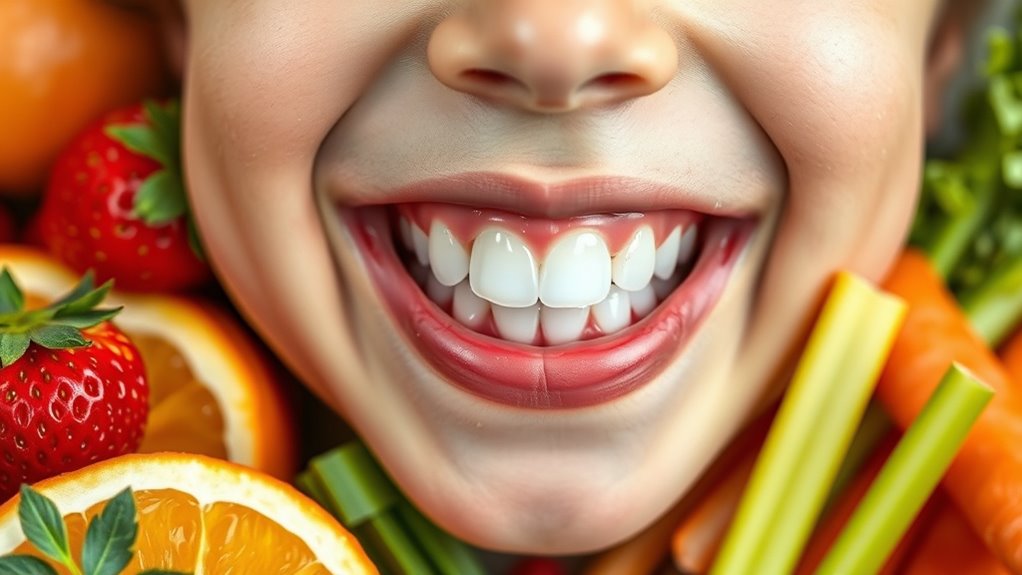
Nutrition plays an essential role in building strong teeth, especially during childhood when teeth are developing. Your child’s dental health depends on consuming nutritious foods rich in essential vitamins and minerals.
Calcium and vitamin D are fundamental for forming and maintaining sturdy tooth enamel, which protects teeth from decay. Minerals like phosphorus, magnesium, and vitamin K2 support the mineralization process, strengthening teeth from within.
Calcium, vitamin D, and minerals like phosphorus strengthen and protect developing teeth from decay.
A healthy diet filled with dairy products, leafy greens, nuts, and fish provides these critical minerals needed for proper dental development. When your child eats a balanced diet, it helps prevent dental cavities and enamel erosion, ensuring their teeth are resilient and durable for life. Additionally, a diet that reduces sugar intake can significantly decrease the risk of cavities and other dental issues.
Being aware of potential allergy risks related to certain foods can help prevent adverse reactions that might impact oral health. Good nutrition now sets the foundation for a lifetime of healthy teeth.
How Sugar and Acid Damage Developing Teeth
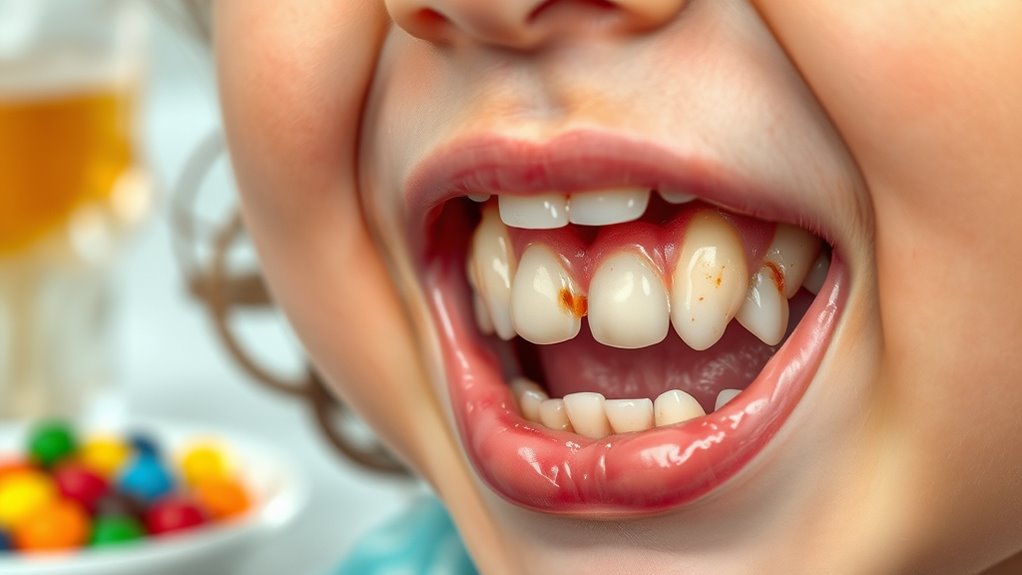
When your child consumes sugary or acidic foods and drinks, it can harm their developing teeth. Bacteria in the mouth feed on sugar and produce acids that weaken enamel, making cavities more likely. Over time, this damage can lead to sensitive teeth and irreversible decay. Promoting digital literacy about oral health can help children understand the importance of good dental hygiene and make healthier choices. Additionally, understanding the trustworthiness of AI models can help caregivers better evaluate health information sources online. Using vetted resources ensures that families access accurate and reliable advice for maintaining their child’s dental health.
Acid Erosion of Enamel
Consuming sugary and acidic foods can considerably weaken your child’s developing teeth. When your child eats or drinks sugary drinks and acidic foods, it causes an acid attack that lowers the pH in their mouth below 5.5.
This acid exposure leads to enamel erosion, where minerals are dissolved from the tooth enamel, causing irreversible enamel damage. Repeated acid erosion weakens the protective layer, making teeth more sensitive and increasing the risk of dental decay and cavities. Understanding the chemical effects of acids on enamel can help in developing better preventive strategies. Studies indicate that regular exposure to acids accelerates mineral loss, emphasizing the importance of enamel protection measures.
Enamel erosion from acid attack is a silent process that can happen quickly with frequent consumption of sweets and acidic beverages. To protect your child’s teeth, limit their intake of these items and encourage rinsing with water after eating or drinking acidic foods, helping to prevent further acid erosion. High refresh rates in some projectors can improve visual clarity, similar to how maintaining good oral habits preserves dental health.
Bacteria and Sugar Interaction
Sugary foods and drinks fuel bacteria in your child’s mouth, causing them to produce acids that attack tooth enamel. When bacteria digest sugar, they generate acid production, which lowers oral pH and creates an environment prone to enamel erosion. Understanding city dynamics can also help parents navigate local dental resources and community programs. Frequent sugar intake prolongs the exposure of teeth to harmful bacteria and acids, increasing cavity risk. As acid attacks continue, the enamel becomes weakened, making teeth more vulnerable to decay.
Because enamel can’t regenerate once damaged, ongoing acid exposure leads to irreversible harm. Maintaining good oral hygiene and limiting sugar consumption reduces bacteria growth and acid formation, helping protect developing teeth.
Understanding how sugar and bacteria interact is essential to safeguarding your child’s oral health and preventing future dental problems.
Cavities and Tooth Decay
Because sweets and acidic drinks lower the mouth’s pH, they create an environment that promotes tooth decay. When you consume sugary foods or sugary drinks, bacteria in plaque ferment these sugars, producing acids that attack enamel. Incorporating data-driven strategies into your child’s dental routine can help identify specific risk factors for decay. Understanding how different brewing methods influence flavor and health can motivate better dietary choices. Frequent exposure to acids from citrus fruits or sodas can erode enamel, increasing decay risk and causing sensitivity. Once enamel is damaged, it can’t regenerate, making decay prevention essential. Recognizing oral hygiene practices that effectively reduce plaque buildup is crucial for maintaining healthy teeth. To protect your child’s dental health, limit sugary foods and drinks, especially between meals, to reduce cavities and tooth decay.
Understanding Tooth Enamel and Its Importance
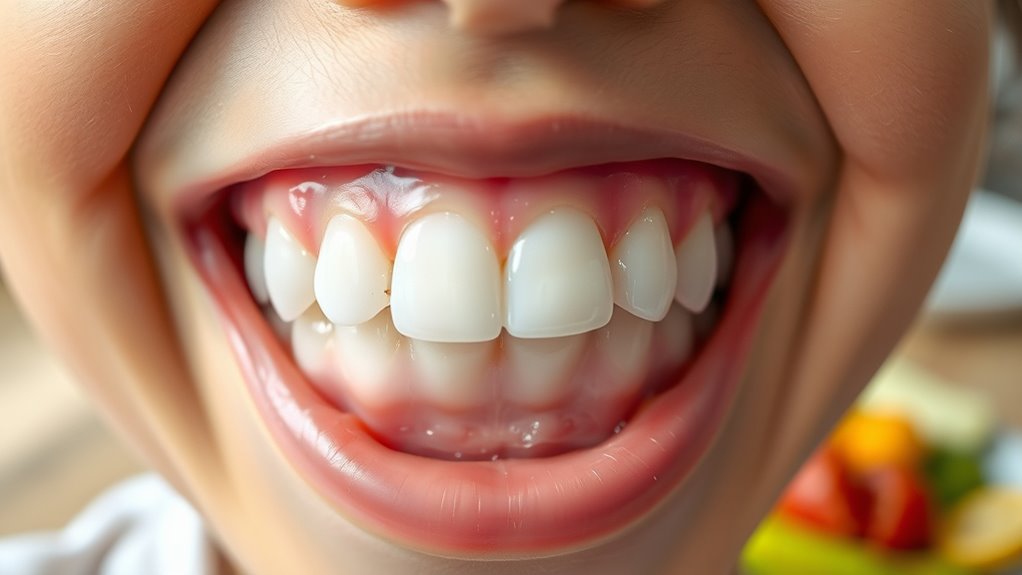
To understand why your child’s diet impacts their dental health, knowing about tooth enamel—the hardest and most mineralized tissue in the body—is essential. Enamel acts as a protective barrier, shielding dentin and pulp from bacteria, acids, and physical damage. Essential oils can also support oral health by reducing bacterial growth and soothing discomfort. Enamel erosion occurs when acids from sugary or acidic foods weaken this outer layer, risking enamel damage and increasing cavity risk. Since enamel can’t regenerate, maintaining its mineralization is crucial for long-term dental protection and overall oral health. Incorporating best oral health practices can further help preserve enamel integrity and prevent decay. Additionally, understanding the role of Floating on water in promoting overall well-being can encourage healthier lifestyle choices that benefit dental health indirectly.
Proper diet and oral hygiene help prevent acid attacks that cause enamel erosion. When enamel stays strong, it supports tooth strength, prevents cavities, and promotes a bright, healthy smile.
Protecting enamel is fundamental for your child’s dental health and future oral well-being.
Choosing Foods That Promote Good Oral Health

Choosing the right foods plays a pivotal role in maintaining your child’s oral health. A healthy diet supports strong teeth and complements good oral hygiene habits.
Incorporate foods and drinks that help prevent dental issues, such as crunchy fruits and vegetables like carrots, apples, and celery, which stimulate saliva and neutralize acids. Saliva production is essential for natural cleaning and remineralization of teeth, helping to prevent cavities. According to store hours, knowing when your local dental supply store is open can help you stock up on necessary dental care products.
Understanding self watering plant pots can also be beneficial for maintaining healthy indoor plants that contribute to a fresh environment, indirectly supporting overall health. Dairy products like cheese, yogurt, and milk supply calcium and phosphates that strengthen enamel. Proper nutrition and adequate hydration are crucial for oral health because they support saliva flow and help fight bacteria that cause decay.
Limiting sugary and sticky foods like caramel and raisins reduces food particles that can cause decay.
Drinking water, especially fluoridated tap water, helps wash away food debris and neutralize acids.
Offering nutrient-rich foods like leafy greens and nuts provides essential vitamins for healthy gums and teeth, reinforcing the importance of a balanced diet plays in dental health.
Additionally, incorporating Snacks – Mad Tasting options can make healthy eating more appealing to children, encouraging better dental habits.
Managing Snacks and Beverages for Better Dental Outcomes

Choosing healthy snacks and drinks can considerably improve your child’s dental health. Opt for options like water and nutritious snacks instead of sugary or sticky treats. Incorporating vegan ingredients and environmentally sustainable practices from personality assessments can help tailor your child’s routines and preferences to support better habits.
Smart Snack Choices
Smart snack choices play an essential role in maintaining your child’s dental health. Opt for healthy snacks like crunchy fruits and vegetables, which help naturally clean teeth and stimulate saliva production, aiding in cavity prevention. Utilizing energy-efficient options such as choosing snacks that promote saliva flow can further help in neutralizing acids and protecting teeth. Limiting sugary foods and sticky snacks such as gummies, caramel, and granola bars, as they leave food particles that promote plaque formation and decay. Serving sweets immediately after meals boosts saliva flow, offering a natural defense against acids. Encourage your child to choose crunchy apples, carrots, and celery that help remove plaque and neutralize harmful acids. Regularly monitoring air quality at home can help reduce the presence of airborne pollutants that may affect overall health, including oral health. Avoid frequent between-meal treats and sugary drinks, as they increase the risk of cavities and food debris buildup.
Drink Water Often
Did you know that drinking water often can greatly improve your child’s dental health? Replacing sugary drinks with water helps rinse away food particles and neutralize acids that cause tooth decay. Drinking water also promotes saliva flow, which naturally cleans teeth and protects enamel. Fluoridated tap water strengthens enamel, providing extra defense against cavities. Consistently choosing water over soda, juice, or flavored drinks reduces exposure to sugars and acids that damage teeth and undermine dental hygiene. Encouraging regular water intake can also help maintain good hydration, which is vital for overall pediatric dental care. Regular hydration supports oral health and helps prevent cavities, ensuring healthier teeth as they grow. Here’s a quick visual to understand the benefits:
| Benefit | Explanation |
|---|---|
| Enamel protection | Fluoridated water strengthens teeth |
| Saliva flow | Helps clean teeth naturally |
| Cavities prevention | Reduces sugar and acid exposure |
| Overall oral health | Supports pediatric dental care |
Creating Healthy Habits for Long-Term Dental Care

Building healthy habits early on is essential for your child’s long-term dental health. Establishing a routine dental care regimen, like brushing twice daily and flossing once, helps remove plaque and prevent cavities. Focus on making smart food choices, such as crunchy vegetables and dairy, to promote saliva flow and strengthen enamel. Limiting sugary and acidic foods and drinks reduces the risk of enamel erosion and cavities. Encourage your child to drink water regularly, which rinses away food particles and neutralizes acids. Educate them about healthy eating habits to foster lifelong oral health practices. Incorporating healthy snack options into their diet can also help support dental health. Developing good dietary habits at an early age can significantly influence your child’s overall health and well-being. Creating these habits now guarantees better dental outcomes later and supports overall children’s dental health. Additionally, choosing aesthetic dinnerware and serveware can make healthy meals more appealing and fun for children, encouraging better eating habits.
Supporting Dental Health Through Proper Hydration
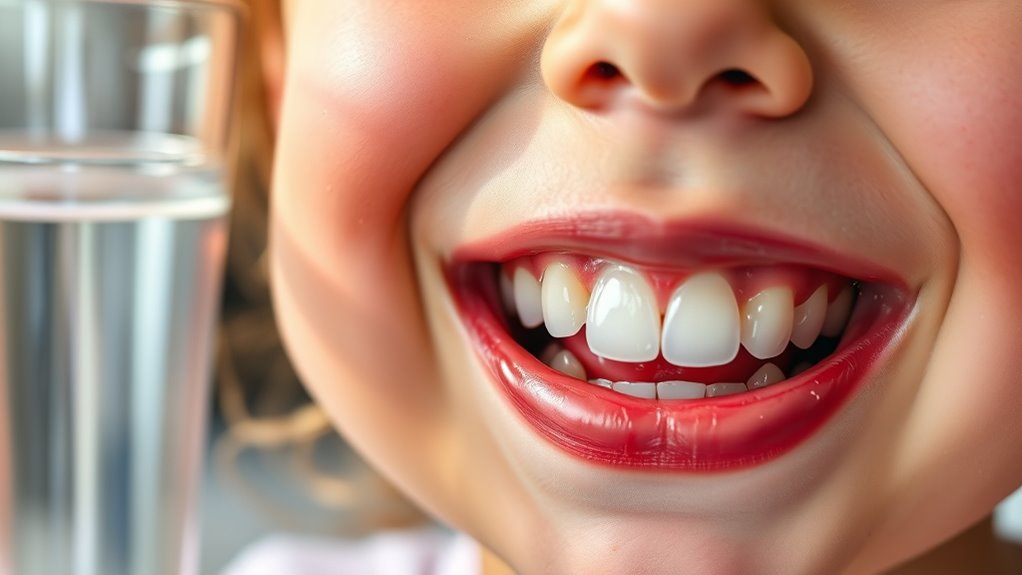
Proper hydration plays a crucial role in maintaining your child’s dental health. Drinking plenty of water, especially fluoridated water, helps strengthen tooth enamel and protects teeth from decay. Water also rinses away food particles and sugars, neutralizing acids that can erode enamel.
After sugary or sticky snacks, drinking plain water minimizes harmful acid and bacterial buildup, supporting oral hygiene. Substituting water for sugary drinks like soda and fruit juices reduces the risk of enamel erosion.
Adequate hydration stimulates saliva production, which naturally neutralizes acids and repairs minor damage to teeth. Maintaining good hydration not only supports overall health but also enhances your child’s ability to protect teeth and prevent cavities, ensuring healthier smiles now and in the future.
Frequently Asked Questions
How Does Diet Affect a Child’s Teeth?
Your child’s diet plays a vital role in their dental health. When they consume sugary foods and drinks, it lowers mouth pH, creating an acidic environment that promotes cavities.
Bacteria feed on sugar, producing acids that erode enamel. Sticky, processed foods cause plaque buildup, risking gum disease.
On the other hand, nourishing foods rich in calcium and vitamin D strengthen teeth, helping your child’s smile stay healthy and strong.
What Foods Contribute to Tooth Decay in Children?
You should know that foods high in sugar, like candies, cookies, and sweetened cereals, promote bacteria growth that causes tooth decay.
Sticky foods such as caramel, gummies, and dried fruits stay on teeth longer, increasing cavities risk.
Acidic drinks like sodas and fruit juices weaken enamel.
Also, frequent snacking on chips or bread fuels bacteria.
Prolonged exposure to sugary liquids from bottles or sippy cups, especially at bedtime, greatly raises cavity chances.
What Is the Most Damaging Food for Your Teeth?
The most damaging food for your child’s teeth is sticky, sugary treats like caramel and gummies. These cling to teeth longer, feeding decay-causing bacteria and increasing cavities.
Sugary drinks like soda and fruit juice lower mouth pH, eroding enamel.
Hard candies can cause fractures, and chewy snacks like taffy stay on teeth, promoting plaque buildup.
To protect their teeth, limit these foods and encourage healthier alternatives.
What Are the Effects of Diet on Teeth?
Your diet can shape your child’s dental health more than you might imagine—it’s like a rollercoaster for their teeth. Eating too many sugary or acidic foods lowers mouth pH, causing enamel erosion and cavities.
Conversely, nutrient-rich foods strengthen teeth and promote saliva production. Frequent snacking fuels bacteria, increasing decay risk.
Drinking water helps neutralize acids and clean teeth, supporting a healthy smile and preventing costly dental issues down the line.
Conclusion
By balancing bites and beverages, you can boost your child’s bright, beautiful smile. Focus on filling their plate with nourishing, nutrient-rich foods while limiting sugary, acidic treats. Establishing enjoyable eating routines and encouraging hydration help create a cavity-free future. Remember, consistent care and clever choices can cultivate a confident, healthy grin that lasts a lifetime. So, stay supportive, steer smart snacking, and set the stage for sparkling, strong teeth every day!
